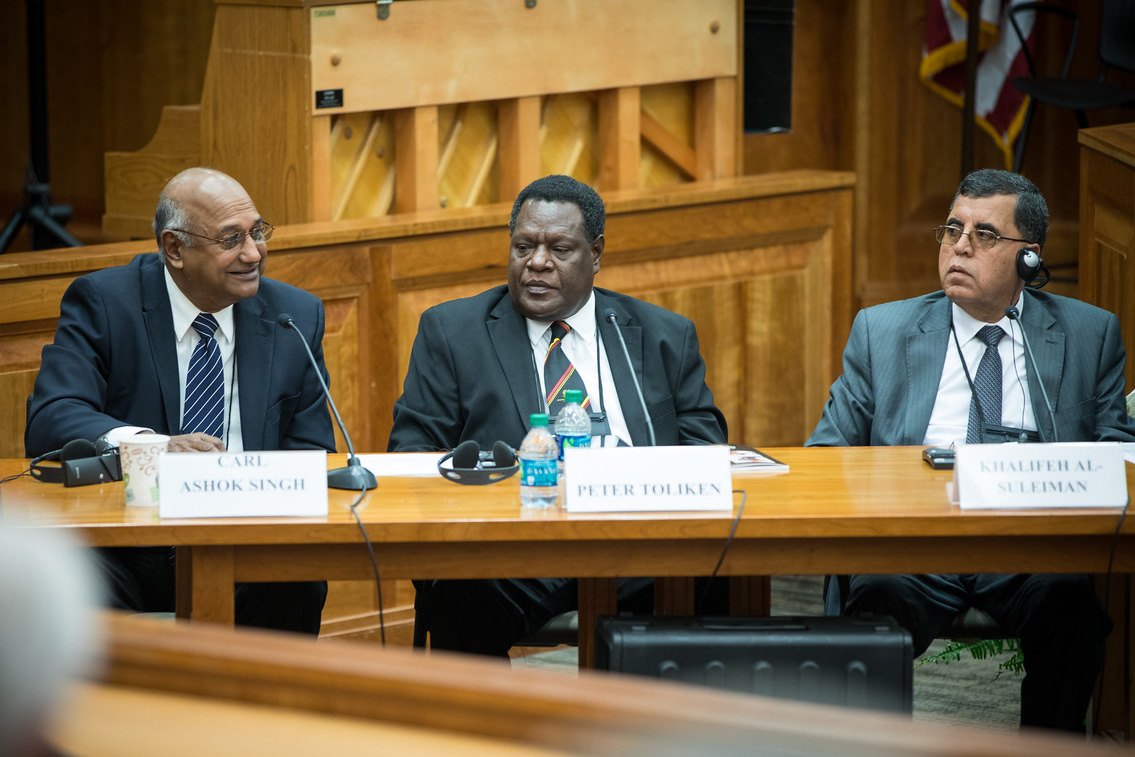Symposium 2017: Religion and the Rule of Law: Judicial Discussion

by Alexander Alton, BYU Law Student and Symposium Volunteer
Judge David Campbell of the United States District Court for the District of Arizona moderated a Judicial Discussion on Religion and the Rule of Law held on Tuesday, October 3, 2017. The panel featured Justice Khalifeh Al-Suleiman, Chief of the High Administrative Court of Jordan; Justice Ahmed Ebrahim, retired justice of the Supreme Court of Zimbabwe; Chancellor Carl Singh, Chancellor of the Judiciary for the Court of Appeals of Guyana; and Justice Peter Toliken of the Supreme and National Court of Justice in Papua New Guinea. All five of the countries represented by the judges were formal British colonies and have a heritage of British common law.
To open the breakout session, each of the judges spoke about the constitutional basis for religious protection in their respective countries. Judge Campbell then asked the judges to expound on the role of an independent judiciary in their respective countries. Chancellor Singh characterized judicial independence as a “key ingredient in the rule of law,” and the resulting discussion consumed most of the remainder of the breakout session, with Judge Campbell periodically interjecting more specific questions regarding judicial independence.
Chancellor Singh explained that judicial independence required more than simple independence for judges in their role as adjudicators; judicial independence also requires institutional independence. He shared an example of how the judiciary in Guyana had to fight to control its own budget. Justice Toliken shared how a key topic affecting judicial independence in Papua New Guinea is term limits for judges—currently, federal judges serve only a 10-year term and the Chief Justice serves only a 6-year term. Justice Al-Suleiman acknowledged a similar issue in Jordan, where appellate court judges serve for 3 years and lower court judges serve for 2 years. Justice Ebrahim made the salient point that even though the judiciary’s independence is meant to be protected by constitutional provisions, “in any event . . . the independence of the judiciary is maintained by what you yourself [as a justice] ensure. You maintain the ethics of the protocols and your fiercely guard those values.” He shared how he fought to maintain his own independence as a justice even while facing several crises of government control of the judiciary during his career.
The justices also discussed the role of religious convictions when passing a judgement. Justice Toliken expressed his belief that a judge must completely remove himself from his religious affiliations when he is sitting on the bench. Judges must live with the conflict between their religious affiliation and their commitment to the constitution on a daily basis. Judge Al-Suleiman affirmed that judges must abide by the law. If a judge feels that he is being unfairly influenced by anything he must recuse himself. Judge Ebrahim expressed that the law should always dictate which way a decision should go. He shared his belief that personal religious convictions should have no bearing on a judge’s decision, backed by the anecdote that he ruled in favor of gay marriage, even though he feels it is not in keeping with his religious beliefs, because he was making the correct ruling within the law. Chancellor Singh shared how justice is symbolized by Lady Justice, who is blindfolded, carries a sword, and holds the scales of justice in her hands. He explained that the significance of the blindfold is that the justice sees no faces and hears no names. Therefore, a judge’s personal religious beliefs or values should not have an impact on a determination of a case because they have no evidential value. Chancellor Singh declared: “A judge who is allowing religious belief and religious value to impact on his determination of a matter . . . is rendering himself/herself unfit to hold judicial office. . .. If a judge finds himself unable to be neutral, then he should recuse himself.”
Judge Campbell shared that when he makes a decision, he will write out the decision with all of his reasoning. He will then ask himself: “Does this written explanation honestly and completely explain the reasons for my decision?” If the answer is no, then he recognizes that he is taking into account something that he does not want to put on paper, and he realizes that he needs to reconsider his decision and resolve this disconnect. Judge Campbell’s final comment was: “At the end of the day, whether or not a judge is independent comes down to the personal integrity of the judge.”